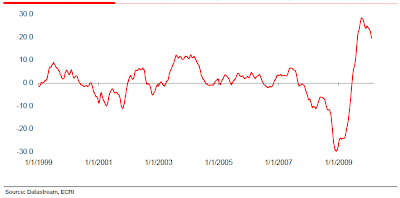Leading indicator shows chance of ‘double dip’
Following the sign of double-dip in housing market, the Leading Economic Indicator (or LEI) shows double-dip scenario is close to reality.
(click to enlarge; graph courtesy of SocGen)
Poor countries pay for undervalued Yuan
Arvind Subramanian of Peterson Institute argues that weak Yuan acts as export subsidy and import tariff, the US gets to enjoy cheaper imports at Chinese expense, but the ultimate victim of China's currency policy is poorer developing countries.
It Is the Poor Who Pay for the Weak Renminbi
by Arvind Subramanian, Peterson Institute for International Economics
China's exchange rate policy has largely been viewed through the prism of global imbalances. That has had three unfortunate consequences. It has allowed China to deflect attention away from its policy. It has obscured the real victims of this policy. And it has made political resolution of this policy more difficult.
No sooner is China's exchange rate policy criticized for creating global imbalances, and hence contributing to the recent global financial crisis, than the door is opened for China to muddy the intellectual waters. Why single us out, the Chinese say? Why not the other surplus-running countries such as Japan or Germany or the oil exporters? And, in any case, countries on the other side of the imbalance—namely, the large current account deficit-running countries—should carry the greatest responsibility for pursuing irresponsible macroeconomic and regulatory policies that led to "excessive consumption." This debate cannot be settled. But inconclusiveness is just what China needs—and creates—to escape scrutiny of its policies.
The second consequence of the global imbalance perspective is that it has created an opposition between current account deficit and current account surplus countries, which has become a slanging match between the United States and China. But an undervalued exchange rate is above all a protectionist trade policy, because it is the combination of an import tariff and an export subsidy. It follows therefore that the real victims of this policy are other emerging market and developing countries—because they compete more closely with China than the United States and Europe, whose source of comparative advantage is very different from China's. In fact, developing countries face two distinct costs from China's exchange rate policy.
In the short run, with capital pouring into emerging market countries, their ability to respond to the threat of asset bubbles and overheating is undermined. Emerging market countries such as Brazil, India, and South Korea are loath to allow their currencies to appreciate—to dampen overheating—when that of a major trade rival is pegged to the dollar.
But the more serious and long-term cost is the loss in trade and growth in poorer parts of the world. Dani Rodrik of Harvard University estimates that China's undervaluation has boosted its long-run growth rate by more than 2 percent by allowing greater output of tradable goods, a sector that was the engine of growth and an escape route from underdevelopment for postwar successes such as Japan, South Korea, and Taiwan.
Higher tradable goods production in China results in lower traded goods production elsewhere in the developing world, entailing a growth cost for these countries. Of course, some of these costs may have been alleviated by China's rapid growth and the attendant demand for other countries' goods. But China's large current account surpluses suggest that the alleviation is only partial.
These emerging market victims of China's exchange rate policy have remained silent because China is simply too big and powerful for them to take on. And this despite the fact that disaffected constituencies now encompass not just companies but also central bankers, who have found macroeconomic management constrained by renminbi policy.
Hence the third consequence. By default, it has fallen to the United States to carry the burden of seeking to change renminbi policy. But it cannot succeed because China will not be seen as giving in to pressure from its only rival for superpower status. Only a wider coalition, comprising all countries affected by China's undervalued exchange rate, stands any chance of impressing upon China the consequences of its policy and reminding it of its international responsibilities as a large, systemically important trader.
It is time to move beyond the global imbalance perspective and see China's exchange rate policy for what it is: mercantilist trade policy, whose costs are borne more by countries competing with China—namely other developing and emerging market countries—than by rich countries. The circle of countries taking a stand against China must be widened beyond the United States to ramp up the pressure on it to repudiate its beggar-thy-neighborism. But progress also requires that the silent victims speak up. Emerging market and developing countries must do a "Google" on China.


